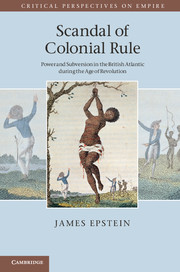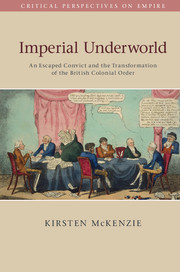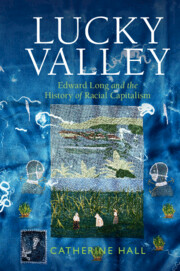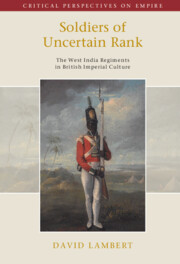Scandal of Colonial Rule
In 1806 General Thomas Picton, Britain's first governor of Trinidad, was brought to trial for the torture of a free mulatto named Louisa Calderon and for overseeing a regime of terror over the island's slave population. James Epstein offers a fascinating account of the unfolding of this colonial drama. He shows the ways in which the trial and its investigation brought empire 'home' and exposed the disjuncture between a national self-image of humane governance and the brutal realities of colonial rule. He uses the trial to open up a range of issues, including colonial violence and norms of justice, the status of the British subject, imperial careering, visions of development after slavery, slave conspiracy and the colonial archive. He reveals how Britain's imperial regime became more authoritarian, hierarchical and militarised but also how unease about abuses of power and of the rights of colonial subjects began to grow.
- Highly readable account of a key colonial scandal and what it tells us about the nature of empire more generally
- Methodologically sophisticated with a range of approaches to colonial history, from law and trials and imperial careering to narrative accounts of colonial rule, debates over labor and production, and the colonial archive as an object of study in itself
- Combines a close study of colonialism on the ground with the broader global context of the age of revolution
Awards
Co-winner of the 2013 Stansky Book Prize, North American Conference on British Studies
Reviews & endorsements
"In this rollicking, sensational tale of imperial misrule, James Epstein takes readers into the colonial underworld peopled by those rogues and scoundrels who both represented British colonial power and defied it in the Caribbean of the early nineteenth century. Drawing on legal records, parliamentary debate, personal memoirs, print culture and the uneven, fragmented remains of the colonial archive, he weaves together the fractious histories of Thomas Picton and William Fullarton, suturing their clash of wills to the most important questions of the day: the rule of law, the fate of free labor and the career of liberalism in and outside the metropole. For all their fugitive archival presence, Epstein never lets the men and women of color whose suffering was the scandal of colonial rule fall below our sightline. This is postcolonial history at its best: erudite, breathtaking, subversive - and portable, in methodological terms, to a host of other imperial times and places as well."
Antoinette Burton, University of Illinois, Urbana-Champaign
"Britain's newly acquired colony of Trinidad was, at the dawn of the nineteenth century, awash with migrants and refugees from across the Caribbean and Africa, its stability poised insecurely between the enslaved demands for freedom, and the repression which was the shank of colonial and plantocratic rule. The Governorship of Thomas Picton - violent, dictatorial and torturing - brought to a head, in an English court, wider debates about colonial law and order, and about British governance on the far edges of empire. Through his clever use of archival materials, on both sides of the Atlantic, James Epstein weaves a compelling tale of popular demands for freedom and justice in the teeth of colonial brutality. Scandal of Colonial Rule offers, via a tantalising snapshot of a one slave colony, a broad panoramic survey of the world of Atlantic slavery - indeed of global domination - in the last phase of Britain’s eighteenth-century empire."
James Walvin, University of York
"James Epstein is a distinguished scholar writing at the peak of his powers. In this masterful book he gives vital new meaning to the old maxim, so much of British history happened overseas."
Marcus Rediker, Distinguished Professor of Atlantic History, University of Pittsburgh
"Louise Calderon was an obscure mixed-race woman of dubious virtue living in Trinidad in the early nineteenth century whose torture led to a famous imperial scandal. James Epstein's remarkable new book shows how this scandal, in his sensitive hands, can illuminate both Louisa's brief moment of notoriety and, more importantly, the strange world of the British empire at its imperial meridian. Based on a wealth of archival research, Epstein reveals an imperial world of startling brutality and disturbing modernity, a world in which both liberalism and authoritarianism were in uneasy and fascinating juxtaposition. A rollicking good read with profound implications."
Trevor Burnard, University of Melbourne
"James Epstein deftly moves between the trial and its background to expose many of the conflicting pressures that were shaping the British Atlantic world."
David Chan Smith, Canadian Journal of History
"James Epstein's Scandal of Colonial Rule reminds us of just how compelling history can be. Epstein centers his work on the story of Louisa Calderon, a mixed-race woman who was tortured by the first British governor of Trinidad, General Thomas Picton, in 1801 in order to force her to admit to her alleged role in a robbery. From this core narrative, and the debates it engendered, he leads us in a dazzling array of directions, demonstrating a mastery of social, cultural, political, gender, legal and imperial history along the way. What emerges is a nuanced and kaleidoscopic view of the British Empire in the decades around 1800, when the British were still grappling with their new global power. This is history simultaneously revelatory and readable, as Epstein leads his readers through a world in which very little was fixed and much was in flux, never losing his footing."
North American Conference on British Studies
"In this powerful and stimulating book, Epstein … contributes significantly to the rethinking of the relationship between [the] British Empire and its colony of Trinidad. Closely connecting the imperial metropolis with the colony, [he] insightfully explains what imperial Britain meant for those at home, as well as for the travelers in the British Atlantic world. Anyone interested in British self-constructions both in the colonies and at home will profit from a careful study of this book."
Tao Wei, International Journal of Maritime History
"This is a fine work of history: deeply researched, beautifully written, suspenseful, and full of insight into the working of colonial rule and colonial violence in the period it examines."
Diana Paton, Social History
"Questions about the way that colonial law fit with metropolitan law, about the different meanings of race and gender in mostly white England and in its mostly nonwhite colonies, and about who could lay legitimate claim to the status of subject of the crown, and what that status offered were not amenable to a single clear answer. Instead they took shape in a response to different contingencies as the center spoke to its peripheries and, to borrow a famous formulation, the empire spoke back. James Epstein has offered a wonderful case study of that process, a case study that speaks to important questions about the meanings of empire in the nineteenth century while casting important if indirect light on the uncomfortable workings of empire today."
James Sidbury, Journal of Modern History
Product details
April 2012Hardback
9781107003309
314 pages
235 × 165 × 19 mm
0.63kg
9 b/w illus. 3 maps
Available
Table of Contents
- Introduction
- 1. Politics of colonial sensation
- 2. A gentleman's way in the world
- 3. 'Only answerable to God and conscience': justice unbounded by law
- 4. Ruling narratives
- 5. The radical underworld goes colonial
- 6. In search of free labor
- 7. Conspiracy in the archive
- Epilogue: moving on.






